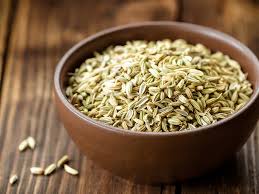Flatulence is produced during the process of digestion. You usually experience this situation after eating certain foods or swallowing excess air. Though gas is quite natural physiologically, if you experience excessive flatulence, this may indicate underlying health problems. What's more, gas can affect your social time, your working day, and your personal relationships. So it is important to learn how to stop farting. Let's find out what you can do to keep flatulence at bay.

How to Stop Flatulence Naturally
You can make certain lifestyle changes to stop flatulence or at least make it more manageable. Here are some steps to take.
1. Limit Your Carb Intake
Limiting how much carbs you consume will help control flatulence. Carbs produce more gas than fat and protein, and that is mainly because bacteria in your gut love undigested carbs and produce gas as a result. There will be more air in your intestines when you consume beer, soda, and other carbonated drinks. This will again make things worse. Opt for foods such as rice, potatoes, grapes, bananas, and other foods that contain easily digestible carbs.
2. Increase Your Fiber Intake
Adding more fiber to your diet will improve digestion and reduce flatulence as well. It is important to increase your fiber intake over time. If you suddenly start eating large amounts of fiber from grains and vegetables, this may aggravate the issue and you may end up getting more gas. Increase your fiber intake slowly and keep it around 20-30g a day.
3. Avoid Certain Foods
To learn how to stop flatulence, it is important to develop a better understanding of which classes of foods to avoid. It is a good idea to avoid starches, usually found in corn, wheat and noodles – you can eat rice though. Avoid beans and certain vegetables such as asparagus, artichokes, Brussels sprouts, broccoli, cauliflower, and cabbage. If you really want to include these vegetables in your diet, be sure to try the cooked and pureed version. You may also want to limit your intake of eggs, dairy products, fried foods and fruits like melons, apricots, prunes, pears, and raw apples,.
4. Soak Your Beans
You may not want to eliminate beans from your diet completely due to their health benefits. Beans and legumes like chickpeas, lentils, soybeans, and black beans contain galacto-oligosaccharides (GOS) that digestive enzymes in your gut cannot break. Interestingly, these medium carb chains are water-soluble, which is why it makes sense to soak beans in water so as to stop the production of gas.
5. Try Warm Lemon Water
Lemon water may help prevent flatulence and even work as a remedy to ease your gas pain. The acidic nature of lemon increases the production of HCL (hydrochloric acid) in your stomach and makes digestion easier. Try warm lemon water because the water will help flush your system and keep your digestive tract healthy.
6. Check Your Eating Habits
Pay attention to how you eat. Do you eat quickly without chewing your food thoroughly? This means you make your digestive tract to work harder. This may also make you swallow more air that will again lead to flatulence. Avoid eating quickly and do not eat too much in one go. Avoid overeating to limit the amount of gas your digestive tract produces.
7. Avoid Swallowing Excess Air
To learn how to stop flatulence, it is important to understand that sometimes what you eat is not to be blamed. If you use a straw to drink, you may end up gulping more air, which will make air bubbles to stick in your gastrointestinal tract. This leads to flatulence. Avoid using straws and do not chew gum because you will swallow more air in this way. Stop smoking because you inhale air when you smoke.
8. Maintain an Active Lifestyle
Stay active and exercise regularly to stop flatulence. Staying active will improve the process of digestion. Exercise will also help improve the function of the bowel and overall digestive system. You may also consider going for a walk when you feel gassy or bloated.
9. Include These Foods in Your Diet
Some foods can help you stop flatulence, for instance:
 Peppermint: It is great for people with flatulence or issues associated with flatulence such as irritable bowel syndrome. Taking peppermint oil capsules for about 4 weeks may help you find some relief from your symptoms.
Peppermint: It is great for people with flatulence or issues associated with flatulence such as irritable bowel syndrome. Taking peppermint oil capsules for about 4 weeks may help you find some relief from your symptoms.
 Ginger: Known for its medicinal effects, ginger can reduce overall gastrointestinal distress by making it easier to pass intestinal gas. It contains a protein digestive enzyme called zingibain that helps prevent the production of gas due to protein-rich foods. Consume fresh ginger for the best effects.
Ginger: Known for its medicinal effects, ginger can reduce overall gastrointestinal distress by making it easier to pass intestinal gas. It contains a protein digestive enzyme called zingibain that helps prevent the production of gas due to protein-rich foods. Consume fresh ginger for the best effects.
 Fennel Seeds: Including fennel seeds in your diet will help you fight flatulence and bloating. These seeds contain the terpenoid anethole that prevents spasms in smooth muscles, including muscles in the intestinal tract. You can use these seeds in different dishes because of their mild flavor. Avoid consuming large amounts of fennel seeds if you are pregnant.
Fennel Seeds: Including fennel seeds in your diet will help you fight flatulence and bloating. These seeds contain the terpenoid anethole that prevents spasms in smooth muscles, including muscles in the intestinal tract. You can use these seeds in different dishes because of their mild flavor. Avoid consuming large amounts of fennel seeds if you are pregnant.
 Papaya: This nutritional powerhouse offers several health benefits and works great to reduce excess gas. It contains a protein-digesting enzyme called papain that helps reduce flatulence and bloating. Opt for green unripe papaya because it contains the highest amount of papain.
Papaya: This nutritional powerhouse offers several health benefits and works great to reduce excess gas. It contains a protein-digesting enzyme called papain that helps reduce flatulence and bloating. Opt for green unripe papaya because it contains the highest amount of papain.
 Chamomile Tea: Peppermint is effective against flatulence but you can try chamomile if peppermint is not what you like. Make a cup of chamomile tea to enjoy its anti-inflammatory, antispasmodic, and highly relaxing properties. Not only does it help with flatulence, it also proves beneficial against heartburn.
Chamomile Tea: Peppermint is effective against flatulence but you can try chamomile if peppermint is not what you like. Make a cup of chamomile tea to enjoy its anti-inflammatory, antispasmodic, and highly relaxing properties. Not only does it help with flatulence, it also proves beneficial against heartburn.
When to See a Doctor
You should seek medical attention if home remedies do not offer any relief. It is a good idea to talk to your doctor if you also have abdominal pain and unusual flatulence. Do not ignore any change to toilet habits, especially if the change persists.
How to Stop Flatulence with Supplements and Medicines
Along with making a change in your diet and lifestyle, you can also use supplements and medicines to stop flatulence. For instance:
- Take charcoal tablets or specific products that contain simethicone to dissolve gas bubbles.
- Take probiotics to increase the number of healthy bacteria in the gut. You can also include certain foods in your diet for the same effect – kefir, yogurt, cultured veggies, and kombucha are some nice options.
- Try digestive enzymes to improve digestion and prevent flatulence. These enzymes help break down fatty acids, amino acids, simple sugars, cholesterol, and nucleic acids to avoid leaving anything for bacteria to eat and produce gas.
- Take anti-flatulence medications like Beano for relief. You will have to take these medications before every meal to help your stomach digest foods in a more efficient manner.
